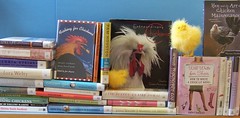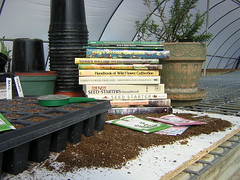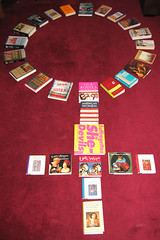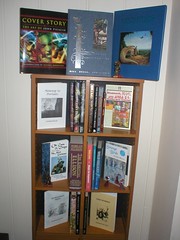 Finally! Sorry for the delay in posting the winners to March’s bookpile contests*. The challenge was a pile to do with spring, Women’s History Month, or Small Press Month. And trust me, I needed the extra time, it was hard to pick from all the incredible pictures!
Finally! Sorry for the delay in posting the winners to March’s bookpile contests*. The challenge was a pile to do with spring, Women’s History Month, or Small Press Month. And trust me, I needed the extra time, it was hard to pick from all the incredible pictures!
And without further delay, the winner (who gets a $50 gift certificate to Abebooks) is…**
Goodsoul (Flickr user PhotoSensate) wins for this mother-inspired book pile. It’s fantastic. I say no more, you must go read the description yourselves.
The runners up, who each receive an annual membershp to LibraryThing, are:
 Runner up one. How could you not love Pesky Library’s contribution: Spring Chicks dig Chick Lit!
Runner up one. How could you not love Pesky Library’s contribution: Spring Chicks dig Chick Lit!

For runner up number two, by vonlafin I loved this spring greenhouse photo—and nothing says spring like dirt!

I’ve added a third runner-up, just for this last photo, about all the projects planned for spring, from dieting to gardening to learning Italian to reading in a hammock. I love it.
There were just too many good entries to display just the winners, so here are a few more favorites.
HerStory was very creative, and full of history!


“What we call women” by roseread is a really neat look at book titles…
And lastly, a shout-out to our only submission featuring small press books, by leennnadine.

See most of the entries here, and the rest are linked to in the comments to this blog post.
Be watching for our next contest, which is a big one…
*I was dealing with my own personal book-piling (rather, piling boxes of books), since I spent the last week moving into a new apartment.
**All winners, please email me so I can pass along the prizes! (abby@librarything.com). Actually, if I’ve posted a picture of your bookpile, email me with your LT user name, so I can include it in the blog post!




 From now on if a public library or a college or university wants to buy memberships for everyone in a community, it’s 5¢/patron, $1/student.
From now on if a public library or a college or university wants to buy memberships for everyone in a community, it’s 5¢/patron, $1/student.







 Today’s
Today’s 